Marlene Zuk has written several books on evolution and animal behavior for general audiences.
Dancing Cockatoos and the Dead Man Test (2022)
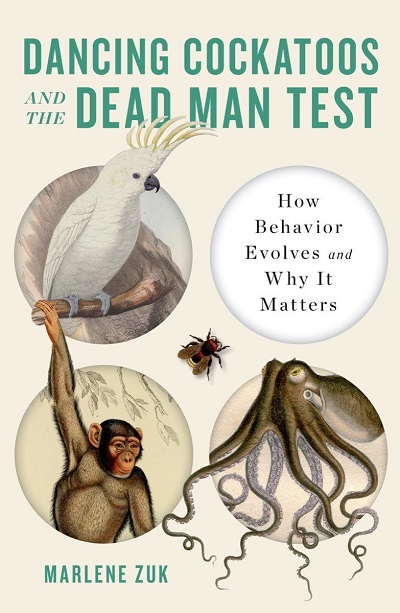
From the jacket:
Longlisted for the 2023 PEN/E.O. Wilson Literary Science Writing Award
A lively exploration of animal behavior in all its glorious complexity, whether in tiny wasps, lumbering elephants, or ourselves.
For centuries, people have been returning to the same tired nature-versus-nurture debate, trying to determine what we learn and what we inherit. In Dancing Cockatoos and the Dead Man Test, biologist Marlene Zuk goes beyond the binary and instead focuses on interaction, or the way that genes and environment work together. Driving her investigation is a simple but essential question: How does behavior evolve?
Drawing from a wealth of research, including her own on insects, Zuk answers this question by turning to a wide range of animals and animal behavior. There are stories of cockatoos that dance to rock music, ants that heal their injured companions, dogs that exhibit signs of obsessive-compulsive disorder, and so much more.
For insights into animal intelligence, mating behavior, and an organism’s ability to fight disease, she explores the behavior of smart spiders, silent crickets, and crafty crows. In each example, she clearly demonstrates how these traits were produced by the complex and diverse interactions of genes and the environment and urges us to consider how that same process evolves behavior in us humans.
Filled with delightful anecdotes and fresh insights, Dancing Cockatoos and the Dead Man Test helps us see both other animals and ourselves more clearly, demonstrating that animal behavior can be remarkably similar to human behavior, and wonderfully complicated in its own right.
Reviews:
"[Zuk] watches and writes with a sense of wonder, curiosity, and the abiding recognition that our own human lives only make sense in light of the behavior of other species…Zuk’s lovely book feels like a cabinet of curiosities whose details remind us to pay attention to the behaviors around us every day."
― Rob Dunn, Science
"Zuk has a knack for weaving in complex scientific theories without ever slowing down the pace, and her vivid descriptions render her wonder contagious…This one's full of fun."
― Publishers Weekly
"Consistently entertaining…Fascinating stories from a knowledgeable, humorous guide. Another winner from Zuk."
― Kirkus Reviews
"This book is a joy―a provocative, highly entertaining exploration of the roots of our behavior. Marlene Zuk dispels the murk and misconceptions about how our sex roles, language, intelligence, even our mental illness came to be, offering a fresh and invigorating view of animal behavior illuminated by her deep knowledge and warm humor."
― Jennifer Ackerman, New York Times best-selling author of The Genius of Birds
"With Dancing Cockatoos and the Dead Man Test, Marlene Zuk, a master of scientific storytelling, presents the natural world as a source of powerful insights for understanding behavior across animal species, including our own. With authority, clarity, and wit, the author guides readers on a revelatory journey into the connected nature of behavior across the tree of life."
― Barbara Natterson-Horowitz, coauthor of Zoobiquity and Wildhood
"In Dancing Cockatoos and the Dead Man Test, Marlene Zuk uses a light touch to probe heavy questions: What is behavior? How is it related to intelligence? Does domestication make one dumb? Over the course of her investigation, she introduces readers to Lesser Black-backed Gulls that lie in wait to steal student sandwiches, crayfish that experience anxiety, and sea slugs that decapitate themselves (all the better to grow a new parasite-free body). The book, sparkling with humor and curiosity, is a pleasure from start to finish."
― Kim Todd, author of Sparrow
Paleofantasy (2013)
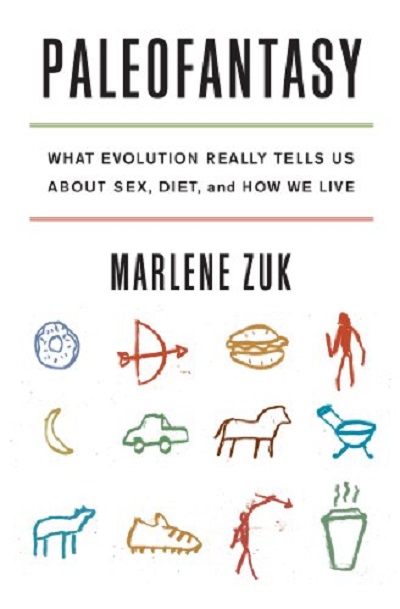
From the jacket:
An exposé of pseudoscientific myths about our evolutionary past and how we should live today.
We evolved to eat berries rather than bagels, to live in mud huts rather than condos, to sprint barefoot rather than play football—or did we? Are our bodies and brains truly at odds with modern life? Although it may seem as though we have barely had time to shed our hunter-gatherer legacy, biologist Marlene Zuk reveals that the story is not so simple. Popular theories about how our ancestors lived—and why we should emulate them—are often based on speculation, not scientific evidence.
Armed with a razor-sharp wit and brilliant, eye-opening research, Zuk takes us to the cutting edge of biology to show that evolution can work much faster than was previously realized, meaning that we are not biologically the same as our caveman ancestors.
Contrary to what the glossy magazines would have us believe, we do not enjoy potato chips because they crunch just like the insects our forebears snacked on. And women don’t go into shoe-shopping frenzies because their prehistoric foremothers gathered resources for their clans.
As Zuk compellingly argues, such beliefs incorrectly assume that we’re stuck—finished evolving—and have been for tens of thousands of years. She draws on fascinating evidence that examines everything from adults’ ability to drink milk to the texture of our ear wax to show that we’ve actually never stopped evolving. Our nostalgic visions of an ideal evolutionary past in which we ate, lived, and reproduced as we were “meant to” fail to recognize that we were never perfectly suited to our environment. Evolution is about change, and every organism is full of trade-offs.
From debunking the caveman diet to unraveling gender stereotypes, Zuk delivers an engrossing analysis of widespread paleofantasies and the scientific evidence that undermines them, all the while broadening our understanding of our origins and what they can really tell us about our present and our future.
Reviews:
“Marlene Zuk’s quest to understand prehistory is an elegant guide for the perplexed. Paleofantasy cuts through a confusing tangle of facts and claims to give us a trustworthy road map to the glorious problems of who we are and where we come from.” ― Richard Wrangham, author of Catching Fire: How Cooking Made Us Human
“We tend to idealize our ancestors, as if they had the perfect life and perfect diet. In highly readable style, Marlene Zuk downplays our paleo-heritage. Not only did we change culturally, we are also genetically a different animal.” ― Frans de Waal, author of The Bonobo and the Atheist
“In thoroughly engaging and witty prose, Zuk (Sex on Six Legs), a biologist from the University of Minnesota, dismantles the pseudoscience behind nostalgic yearnings for our caveman days.” ― Publishers Weekly
Sex on Six Legs (2011)
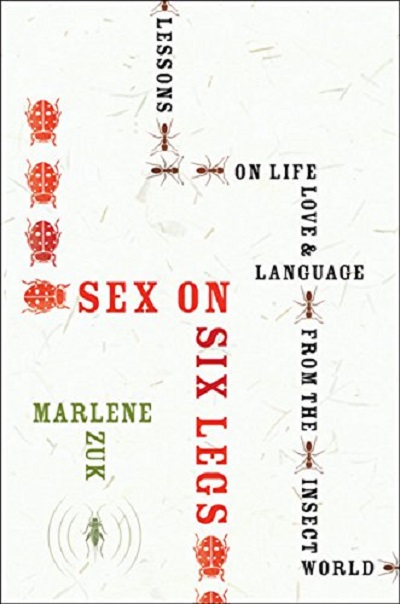
From the jacket:
Insects have inspired fear, fascination, and enlightenment for centuries. They are capable of incredibly complex behavior, even with brains often the size of a poppy seed. How do they accomplish feats that look like human activity— personality, language, childcare—with completely different pathways from our own? What is going on inside the mind of those ants that march like boot-camp graduates across your kitchen floor? How does the lead ant know exactly where to take her colony, to that one bread crumb that your nightly sweep missed? Can insects be taught new skills as easily as your new puppy?
Sex on Six Legs is a startling and exciting book that provides answers to these questions and many more. With the humor of Olivia Judson’s Dr. Tatiana’s Sex Advice to All Creation, Zuk not only examines the bedroom lives of creepy crawlies but also calls into question some of our own longheld assumptions about learning, the nature of personality, and what our own large brains might be for.
Reviews:
Sex on Six Legs "waxes exuberant [on insects] over nine consistently delightful chapters... [Zuk is] wry, mischievous and conversational. The book can be unsettling at times, but it persistently aroused in this reviewer a wriggling, six-legs-up delight." ― New York Times Book Review
"Smart, engaging...Zuk approaches her subject with such humor and enthusiasm for the intricacies of insect life, even bug-phobes will relish her account." ― Publishers Weekly
"...one of the most readable books about insect behavior...Zuk has the uncanny ability to take what most of us consider just plain creepy and turn it into the fascinating and the revelatory." ― Booklist
"A global sampling of the clever lives and loves of our six-legged friends. Zuk's chapters, particularly on social insects, are rich in examples... Plenty of intriguing questions to ponder as Zuk informs adults in a droll style that may also turn on younger readers. After all, entomology is still a field that can begin, as it did for her, with venturing into the yard to collect stuff in a glass jar." ― Kirkus Reviews
"Incest, democracy, tyranny, sexual cannibalism: insects have them all, and more. In Sex on Six Legs, Marlene Zuk gives insects, the animal kingdom's unseen majority, their full, marvelous due." ― Carl Zimmer, author of The Tangled Bank: An Introduction to Evolution and A Planet of VirusesRiddled with Life (2007)
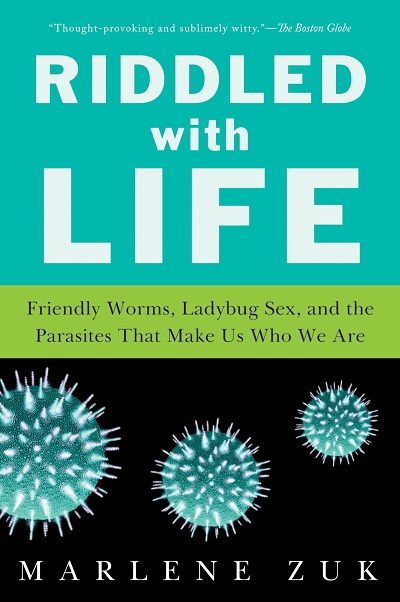
From the jacket:
We treat disease as our enemy, and germs and infections as things we battle. But what if we’ve been giving them a bum rap? In this witty, engaging book, evolutionary biologist Zuk makes us rethink our instincts as she argues that disease is our partner, not our foe.
From the earliest days of life on earth -- parasites spurred the creation of complex life forms -- disease has evolved alongside us, becoming not only natural but essential to our health. Drawing on the latest research and most unusual studies, Zuk explains the role of disease in answering a fascinating range of questions: Why do men die younger than women? Why are we attracted to our mates? Why does your average male bird not have a penis? Why do we--as well as insects, birds, pigs, cows, goats, and even plants--get STDs? Why do vultures have yellow heads and roosters have red wattles? Why do we have sex at all, rather than simply splitting off copies of ourselves like certain geckoes? And how is our obsession with cleanliness making us sicker?
Using her own work on sexual selection as well as an amazing sampling of stories from the natural world, Zuk makes us reconsider the fearful parasite.
Reviews:
"Fascinating." ― Natalie Angier, The New York Times
"What's eating you? Or to put it more politely, 'sharing your space,' which happens to be your body? The answers are oddly consoling in evolutionary biologist Marlene Zuk's witty 'disease appreciation' course . . . Beguiling." ― O, The Oprah Magazine
"Zuk's book makes disease scintillating, wryly amusing and even sexy. Her enthusiasm and a hundred examples propel the reader to a deeper understanding of the nature of life." ― Randolph M. Nesse, author of Why We Get Sick
Sexual Selections (2002)
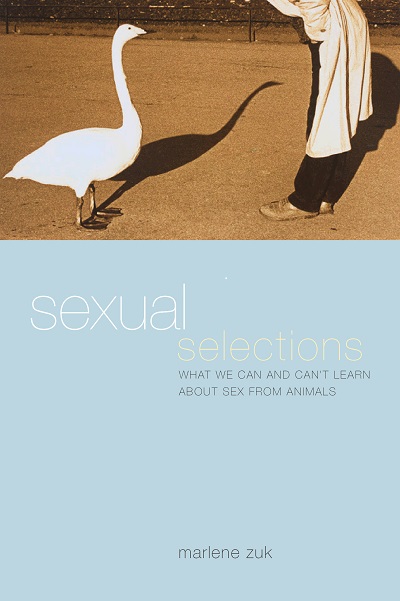
From the jacket:
Scientific discoveries about the animal kingdom fuel ideological battles on many fronts, especially battles about sex and gender. We now know that male marmosets help take care of their offspring. Is this heartening news for today's stay-at-home dads? Recent studies show that many female birds once thought to be monogamous actually have chicks that are fathered outside the primary breeding pair. Does this information spell doom for traditional marriages? And bonobo apes take part in female-female sexual encounters. Does this mean that human homosexuality is natural? This highly provocative book clearly shows that these are the wrong kinds of questions to ask about animal behavior. Marlene Zuk, a respected biologist and a feminist, gives an eye-opening tour of some of the latest developments in our knowledge of animal sexuality and evolutionary biology. Sexual Selections exposes the anthropomorphism and gender politics that have colored our understanding of the natural world and shows how feminism can help move us away from our ideological biases.
As she tells many amazing stories about animal behavior--whether of birds and apes or of rats and cockroaches--Zuk takes us to the places where our ideas about nature, gender, and culture collide. Writing in an engaging, conversational style, she discusses such politically charged topics as motherhood, the genetic basis for adultery, the female orgasm, menstruation, and homosexuality. She shows how feminism can give us the tools to examine sensitive issues such as these and to enhance our understanding of the natural world if we avoid using research to champion a feminist agenda and avoid using animals as ideological weapons.
Zuk passionately asks us to learn to see the animal world on its own terms, with its splendid array of diversity and variation. This knowledge will give us a better understanding of animals and can ultimately change our assumptions about what is natural, normal, and even possible.
Reviews:
"Zuk takes the reader on a tour, and her message is an eloquent and important warning: because gender biases have shaped the way researchers have studied animal behaviour, and because we also look to the behaviour of animals to inform ourselves about our own behaviour, we are in danger of perpetuating these gender biases. Take heed!"― BBC Wildlife Magazine
"Zuk's analogies are better than anyone's—pithy, insightful, and funny. Who said feminists lack humor? Zuk made me laugh with deep pleasure more than once, as she reviewed the lessons of feminism for our understanding of non-human animals. Her main point—that studying the lives of non-humans should not be for the lessons they seem to provide for our political purposes, but for the pleasure of knowing nature on its own terms—will be compelling reading for all naturalists, feminists and not-feminists alike." ― Patricia Adair Gowaty, editor of Feminism and Evolutionary Biology
"Marlene Zuk uniquely combines a great breadth of knowledge about the behavior of animals with an ability to challenge conventional wisdom. She also writes with a graceful style and a mischievous wit. The result is a bold, fresh and feminist book about how our sex lives evolved." ― Matt Ridley, author of Genome
"This is an engaging and much needed book, which I hope will be widely read." ― Sarah Blaffer Hrdy, author of Mother Nature: Maternal Instincts and How They Shape the Human Species